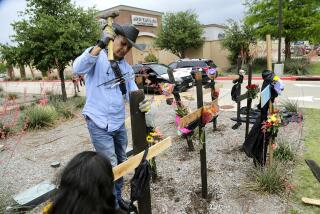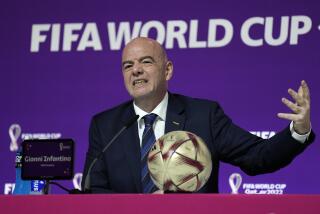S. Africa’s Soccer Goal a Net Gain
JOHANNESBURG, South Africa — This nation’s successful bid over the weekend to host the 2010 World Cup soccer championship has brought South Africans both an “our turn” sense of pride at becoming the continent’s first host of the coveted sporting event and hope for a desperately needed economic boost.
Estimates of the International Football Federation Assn., or FIFA, tournament’s financial benefit to South Africa varied from a direct injection of $3.14 billion, according to an accounting firm study done before the announcement, to an optimistic $17.64 billion, trumpeted on South African Broadcasting Corp.’s Channel One over the weekend. The sum includes indirect benefits such as increased tourism. There are hopes the event will create 160,000 jobs in a land with 40% unemployment.
But perhaps just as important was the huge psychological boost for a country still deeply divided 10 years after the first democratic elections that ended the apartheid era.
The announcement caused a spontaneous, joyful party throughout South Africa, which continued all weekend. Thousands watched the decision Saturday on large open-air screens in various locations, and broke into jubilant dancing and singing when the news came from Zurich, Switzerland, that FIFA, soccer’s international governing body, had voted 14 to 10 for their country’s bid.
Many saw it as a way for the country to forge a new sense of identity. According to sportswriter Peter Robinson in Friday’s edition of the daily newspaper This Day, put simply, South Africa just needed the World Cup.
“To turn to South Africa’s desperate need for a World Cup, perhaps it goes to [President] Thabo Mbeki’s view that we are still two nations,” he wrote, referring to the continuing divisions between the poor black majority and the rich whites who still control much of the nation’s economic wealth.
“Ten years of democracy might have passed, but we await the event, the moment that we can share together,” Robinson wrote, adding that the country had experienced brief moments of unity while playing host to other international sporting events, such as the 1995 rugby world championship. “What we want is something that lasts, something that we can work toward as a country, something that will leave a legacy -- socially, economically and perhaps even politically.”
In South Africa, the expectations loaded upon winning the bid for this sporting event were enormous. Cape Town’s Sunday Argus newspaper said it would “heal the nation.”
Mbeki saw it as a historic turning point for the continent.
“We want to ensure that one day, historians will reflect upon the 2010 World Cup as a moment when Africa stood tall and resolutely and turned the tide of centuries of poverty and conflict,” he said.
Danny Jordaan, who led South Africa’s campaign, said the century-old soccer federation had finally found Africa to be worthy, and that the games would give hope to poor and unemployed South Africans.
Jordaan and the other leaders involved in the bid returned to South Africa on Sunday and immediately made a triumphal tour of the black townships of Soweto and Alexandra, both near Johannesburg, in an open-topped bus.
Analyst Patrick Laurence, of the independent Helen Suzman Foundation, said some of the predictions of the event’s significance to the country were overstated. But he said soccer was a sport beloved by the black majority and that the World Cup was far more important to them than similar sporting events, such as the cricket world championship held in South Africa last year.
“It’s obviously an immediate boost for South Africa, particularly after the long period of isolation under apartheid,” he said.
But there was a sour note for people here, with reports that all African countries participating in the decision Saturday cast their votes against South Africa. “South Africa was cruelly -- and unexpectedly -- deserted by its African friends,” said a front-page story in the Sunday Times.
Nigeria withdrew from the race to support South Africa’s bid. Nigerian Football Assn. Chairman Ibrahim Galadima said South Africa had everything needed to hold an event worthy of the continent and the world. He called on other African countries to back the South Africans however they could.
“Hosting a soccer World Cup is a huge challenge, and 2010 is just around the corner,” he said. “We want to believe that South Africans appreciate the enormity of the task ahead.”
In South Africa, most of the stadiums needed for the competition already exist and simply require upgrading, while four remain to be built. The cost of staging the event is estimated at $329 million.
The World Cup announcement comes amid a surge in infrastructure projects, such as a planned 300-foot-tall “Statue of Freedom,” a likeness of Nelson Mandela, in Port Elizabeth; a high-speed rail link; and a new international airport.
Maria Ramos, head of Trans- net, the state transport monopoly, said the World Cup would put the country on the tourism map. “And with that will come jobs, jobs, jobs,” she said, quoted in the Sunday Times. Business leader Raymond Ackerman, head of the large supermarket chain Pick ‘n Pay, said it would be “just great for the morale of the country, and great for the economy and jobs.”
Along with the race to build and upgrade infrastructure, South Africa also has to rebuild its soccer reputation: Its national team is ranked 40th by FIFA. South Africa qualified for the last two World Cup competitions but did not get past the first round.






